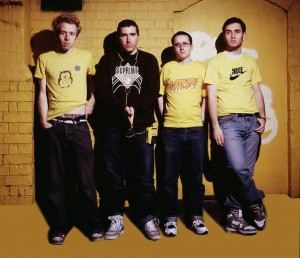
We’ve talked ad nauseum about the importance of interacting with your fans via the many social media outlets like Twitter and Facebook, via your very own iPhone app, and also via a newsletter. As you fanbase grows, however, you’ll need a way to manage this process. Enter FanBridge. What FanBridge does “is very, very simple: help musical acts email and text their fans.”
FanBridge, which is all about “powering valuable fan relationships,” will help you not only get more fans, but also keep them engaged, and track your analytics so you can see what’s working and what’s getting them excited. After all, that’s what you’re working toward isn’t it — getting (and keeping) your fans excited? Let’s examine their 3 steps: 1) get more fans, 2) excite your fans, and 3) keep your fans engaged.
Get More Fans
Let’s say you’re somewhat organized and established and you already have a list. It’s super easy to add said list to your account. They’ll even do it for you for free if you want. Once you’ve got a list going in FanBridge, then you’re ready to start growing it.
Fans that come to your website/blog/myspace etc. need a place to type in their email address so you can add them to your list. FanBridge will whip up the code you need for these forms which, of course, are totally customizable in look and feel. They even have downloadable signup forms for live shows/events that’ll work without an internet connection.
If you are offering a fan incentive, like a free download with signup, they handle everything. You just upload the incentive. Easy.
Excite Your Fans
FanBridge makes converting browsers into buyers easy with simple tools that take visitors to the point of sale for whatever it is you’re selling (i.e. tickets, merch etc.) Whatever actions your fans take are tracked and converted into data that help you understand which of your campaigns are most effective, who is clicking on what, and what you need to do to reach out to your most active fans.
Another important feature is the tour calendar. Your calendar can be part of your newsletter and is also posted on your fan “action page.” Fans can even set reminders about your shows.
FanBridge understands how valuable your fans’ friends are, and gives your fans the tools they need to share your music with them. Viral marketing tools like contests, prizes, “share this” links, etc. are automatically integrated into the system. Remember, the easier it is for your fans to share your music with others, the more likely they are to do it!
Keep Fans Engaged
Artist-fan interaction has become the norm. Finally. It takes a LOT of work to stay on top of all the various ways you are interacting with your fans, though, and you can’t afford to waste your valuable time toggling between twitter clients, facebook pages, and everything else. FanBridge solves this problem by allowing you to communicate with fans across many networks all from a single location.
Email newsletters (which are super important) are a breeze to send out, because FanBridge handles all the backend stuff for you. You simply need to come up with the irresistible content that goes in them.
Another brilliant feature is their mobile text messaging platform. Imagine sending last minute text messages to your fans to remind them about your upcoming show or sending updates from backstage! You can schedule them to send later, too, so you don’t have to worry about doing it live all the time.
This service is priced insanely low for all the cool stuff you get. Seriously. Really cheap.
In case you’re still not convinced you need FanBridge, they’ve come up with 5 simple reasons why you need them: 1) you get superior client service from real, live people, 2) their only priority is making your fan list more valuable, 3) they automate the fan-getting process so it’s working for you 24/7, 4) they do all the analysis so you don’t have to, and 5) you can communicate with all your fans in one place.
Be sure to check out these handy FanBridge resources too:
Tips on Sending Effective Fan Newsletters
3 Fan List Basics for Musicians
How Do I Get More Emails at Live Shows/Events?
 This is the first post in a series of guest posts by MusicNomad, a musicians advocate organization that researches, reviews and ranks thousands of companies in the music industry to filter out the ones that help musicians the most.
This is the first post in a series of guest posts by MusicNomad, a musicians advocate organization that researches, reviews and ranks thousands of companies in the music industry to filter out the ones that help musicians the most.







